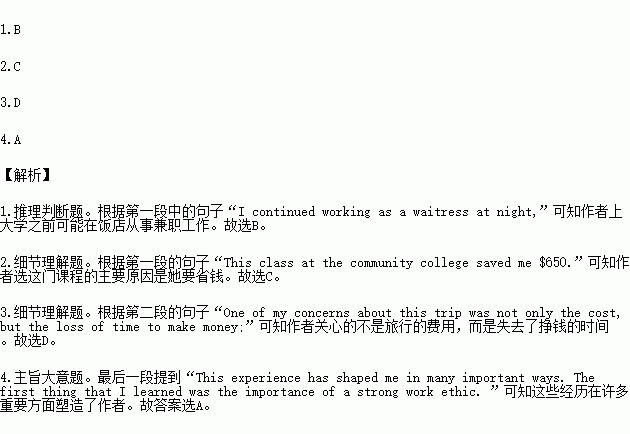题目内容
Finally, I entered the university.Because of my careful savings, I did not have to work during the school year. Then, summer came and it was time to work harder than ever. I continued working as a waitress at night, instructed tennis camps several mornings a week and worked as a secretary for a few hours in the afternoons. I even decided to take a class at a community college. This class at the community college saved me $650. It was an extremely tiring summer and made me anxious to return to my relatively easy life at the university.
During my second and third years of undergraduate schooling, I decided to work about five hours per week in the campus admissions office answering phones. This provided a little spending money and kept me from drawing my savings out. The overall situation looked hopeful as I approached my senior year as long as I could make as much money as I had the previous summer. I wanted to go to Israel to study for 3 weeks, but I hesitated in making this decision because it would cost me 1,600 in the bank that I had forgotten about! One of my concerns about this trip was not only the cost, but the loss of time to make money; however, I made as much that summer in the ten weeks when I was at home as I had made during the fourteen weeks when I was at home the summer before. The way everything worked together to make this trip possible was one of the most exciting things that have ever happened to me.
This experience has shaped me in many important ways. The first thing that I learned was the importance of a strong work ethic. Working long hours did a lot to develop my character and helped me learn the value of a dollar. It also made me learn how to search for creative ways to settle difficult situations.
1.Where did the writer probably work part-time before attending the university?
A. In the tennis camps B. In a restaurant
C. In a company D. In the admissions office
2.The writer took a class at a community college mainly because_____.
A. summer time was tiring
B. life there was relatively easy
C. she wanted to save money
D. it was required by the university
3.The writer’s concern about the trip to Israel was that _____.
A. her mother would not give her approval
B. she would fail to get credits in Israel
C. $1,600 couldn’t be drawn out in time
D. a summer job would be lost
4.The passage is mainly about how the writer _____.
A. was shaped by working part-time through college
B. managed to make full use of her vacation
C. was forced to support herself by her mother
D. made money on the college campus


